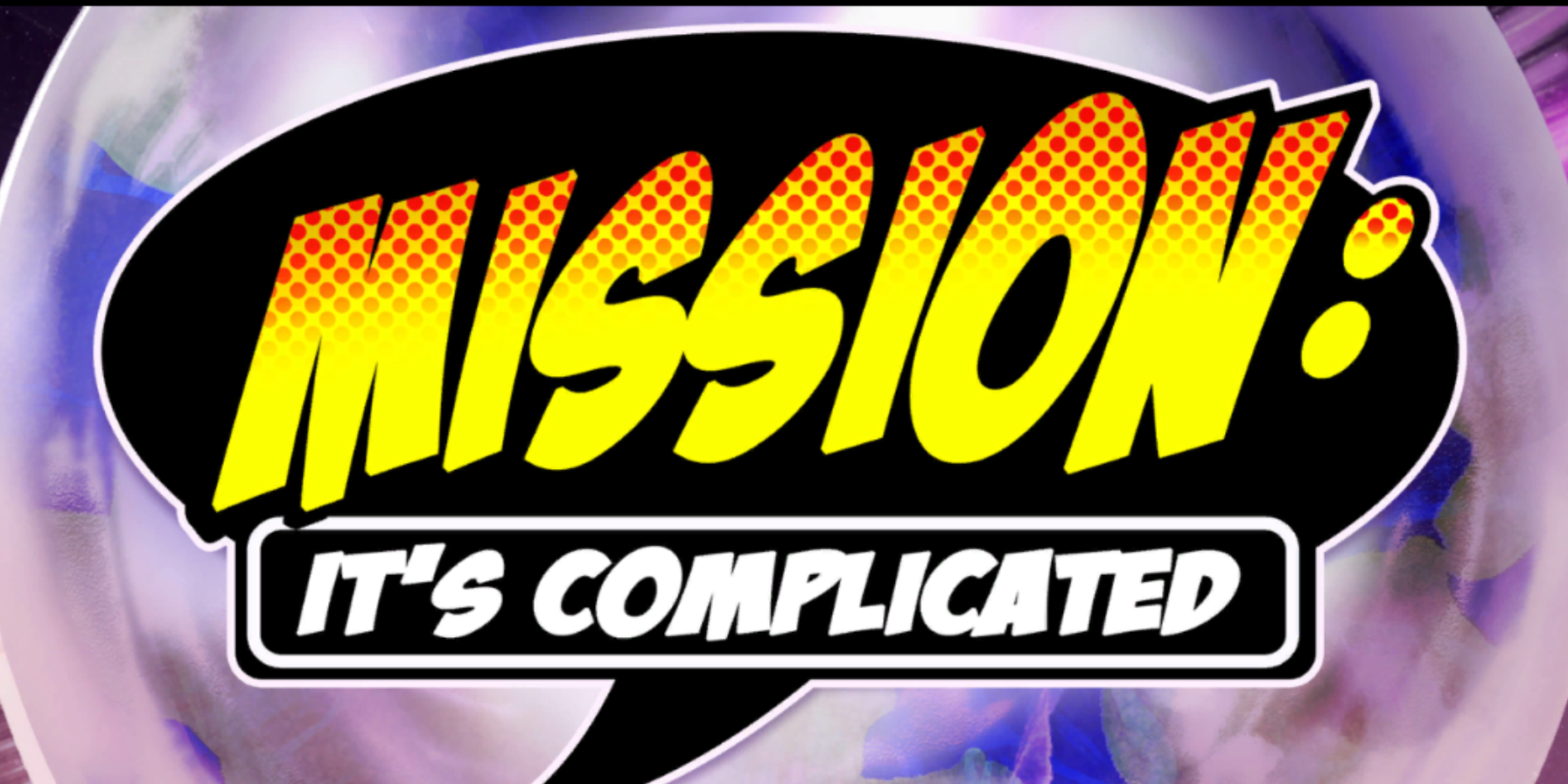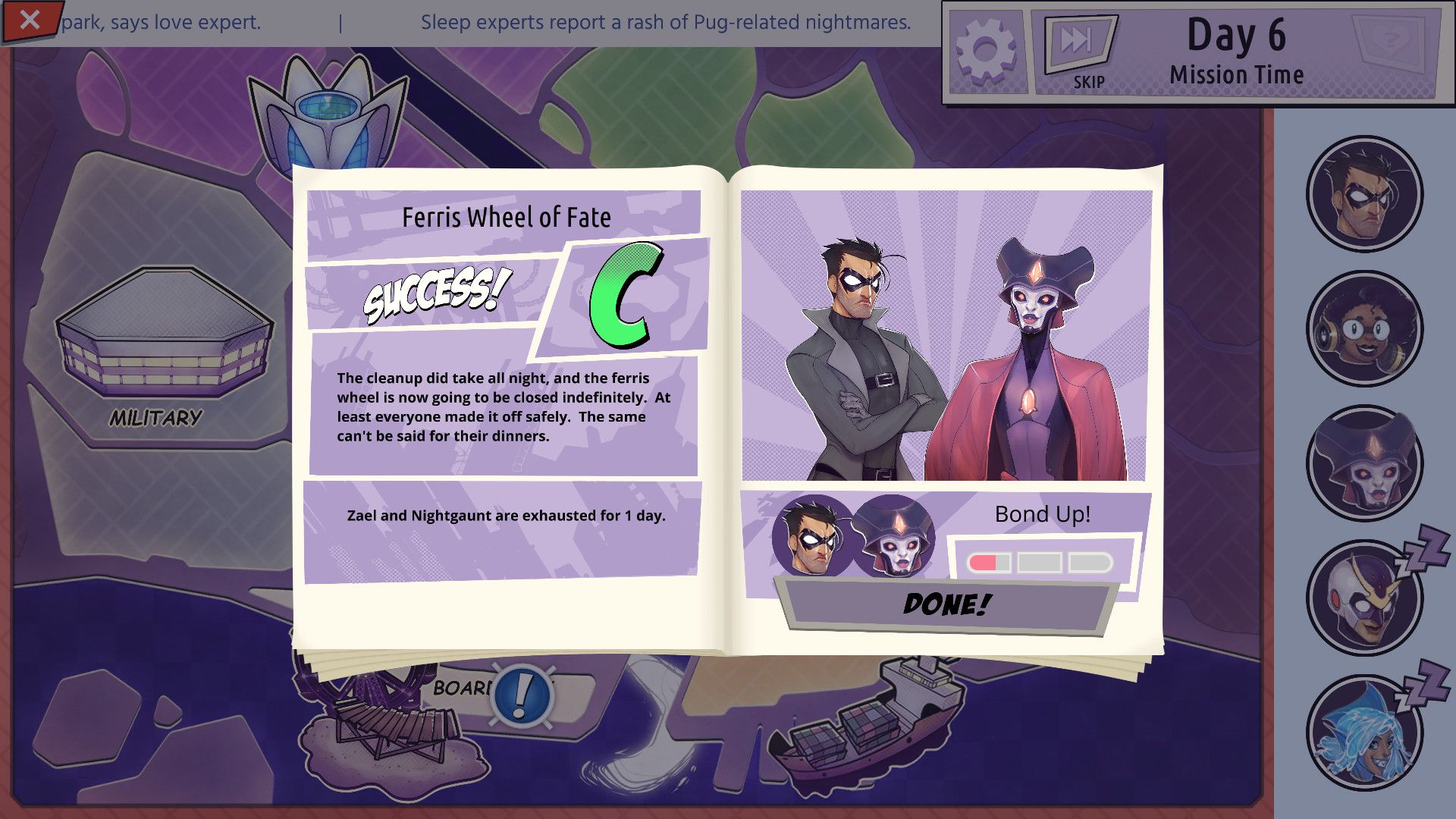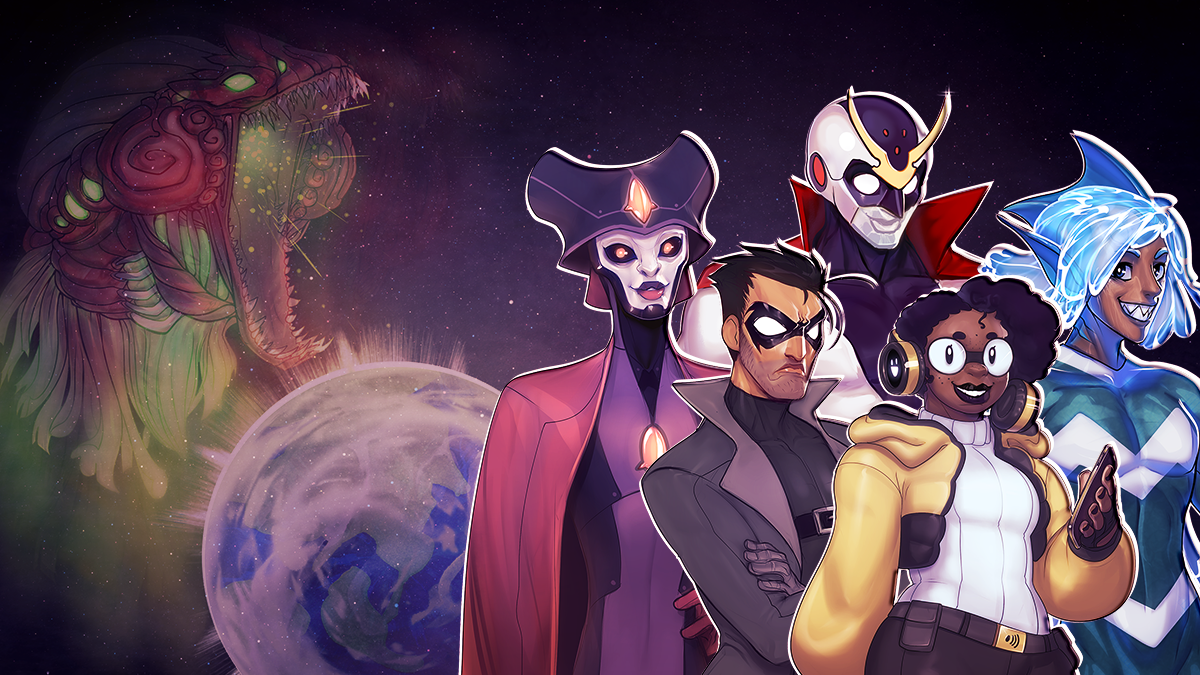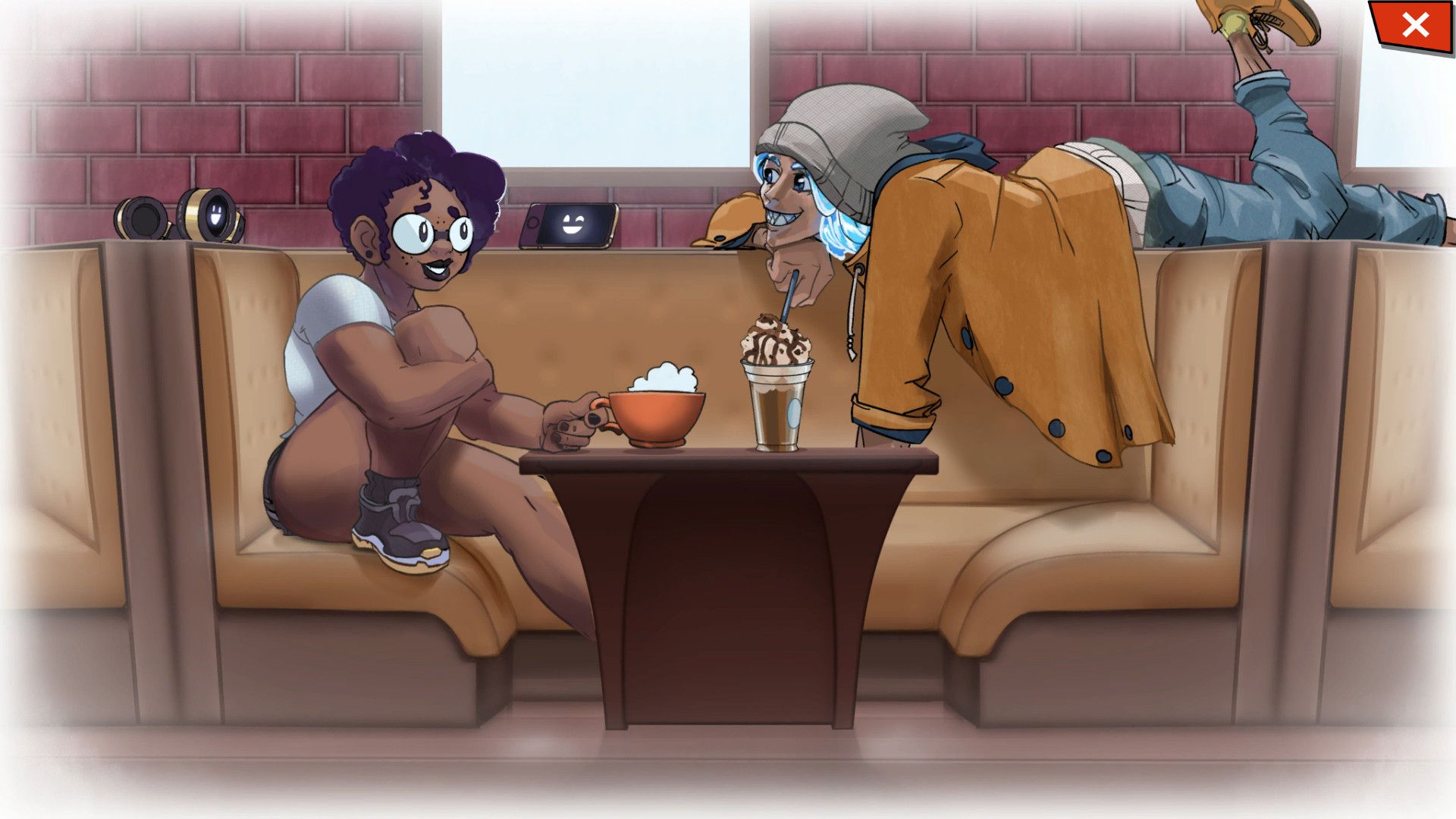By depicting nuanced, complicated people from different walks of life and backgrounds, art can foster connections, allowing one to both come to care about those who are different from themselves while also giving those same unique people a chance to connect with someone like themselves. Mission: It's Complicated, from Schell Games, is a superhero game that works to foster empathy for LGBTQ people by providing nuanced depictions of their relationships.
A free-to-play game, Mission: It's Complicated is a visual novel in which the player -- who takes on the role of Professor L -- works to build relationships between the five heroes on their team so as to save the world from a deadly threat to Earth. The team's five members -- tech-wiz Wifi, assassin Nightgaunt, alien exile Zael, the physically powerful Zirconia and aquakinesis user Riptide -- each represent different dimensions of LGBTQ identity. However, they're not reduced to their gender identity or sexuality. Instead, they're given room to be full-fleshed out characters with complex hopes, wants, anxieties and baggage.
Where The Idea For Mission: It's Complicated Came From
Schell Games Senior Engineer Misha Velichansky told CBR by email that the studio got the idea for Mission: It's Complicated from "romantic superhero fanfiction. And the tension queer ships in fanfiction have with canon [...] I really liked the idea that any pairing would be considered canon by the game."
Mission: It's Complicated was also, in part, inspired by Velichansky's love of The Legend of Korra, and in particular the relationship between the titular Avatar and the non-bender Asami. That ship, dubbed Korrasami, was a popular one in the The Legend of Korra fandom -- and the series did eventually put the two in a canonical relationship. "It felt so incredible," Velichansky said. "This was my attempt to recreate that experience. Whatever character pair speaks to you the most, it's canon, it's real, it's legitimate."
While financial obligations might, in some cases, keep someone from being able to get access to LGBTQ content, that's not the case with Mission: It's Complicated, which is a free-to-play game without microtransaction. Schell Games CEO Jesse Schell called the choice to make the game free-to-play "an experiment" resulting from having "a complete game with a relatively small monetary investment." If the game was successful, Schell figured the team would later be able to find a way to monetize Mission: It's Complicated or "just make an even bigger sequel."
However, part of this choice was -- according to Schell -- driven by the idea of making Mission: It's Complicated "super accessible to queer teens -- for queer folks in general" as a way "to give something joyful back to the community."
RELATED: Ironheart: [SPOILER] Reminds Riri She Can Still Be a Hero
Why Romantic (And Non-Romantic) Ships Matter
The ability to choose one's preferred ships was part of the reason Velichansky and Schell Games chose to do Mission: It's Complicated as a visual novel. "I pitched the idea of a game where you could ship -- put in a relationship -- any pair of superheroes you wanted," Velichansky said, explaining the design team already had an engine on which to build Mission: It's Complicated as a result of a previous project.
"I think that feeling of being able to choose which relationship you're most invested in, and then getting rewarded for that choice with unique interactions and scenes, is really core to the experience," Velichansky continued. "You form your own relationship with each pairing, you create a unique story of what adventures helped that relationship to grow, you helped guide (or maybe hindered) their relationship along the way. I think (I hope) it makes the pairings feel that much more personal to the player. And while it's certainly not as open-ended as picking some tags and going to town on [fan-fiction website AO3], my goal was to recapture some of that same feeling of finding exactly the stories you personally need. A kind of build-your-own-canon engine. Making it a game packages all that together in one experience."
RELATED: Teen Titans Kills Off a Major Arrowverse Villain
However, while ships are often understood as romantic, Mission: It's Complicated features a number of non-romantic pairings. While initially there weren't plans to have non-romantic ships in the game, Velichansky later made the choice to include "friendship pairings that were written with the same emotional weight and intensity as the romantic pairings. And I think it worked. I love them. We undervalue friendship in our culture, but it's just as important, just as powerful a force as romantic love--and I think arguably more important for our survival and emotional well-being."
Velichansky's preferred ship, for example, was Wifi and Riptide, which is a non-romantic relationship. "It's all about their mutual bonding over having mental health issues -- Wifi says they're Bad Brain Buddies -- and that all comes from such a personal place for me that I just fell for it completely," Velichansky said. "It manages to touch on serious things while also being completely ridiculous and silly. It's about found family, finding people who get you and are ride-or-die for you.
"It was one of the last pairings I wrote, and I think it just encapsulates so much of what I wanted to do with this game and with these stories. It's one of the few things I've written that I can enjoy as a fan."
Orlando, whose work on Midnighter as well as Midnighter and Apollo earned him a GLAAD Media Award for Outstanding Comic Book nomination in 2017, explained to CBR over the phone that Schell Games reached out to him because of his work on queer characters. Despite not being much of a gamer, Orlando explained, "I do, obviously, as a writer always react to backstories, sort of character push and pulls, and I was really taken with the creativity of the lead and how they put together a five person team when you start that really has a lot of inbuilt tension, things to learn from each other. So, from a narrative and character standpoint, I was just really impressed with how they built the skeleton of this story, because sometimes you don't get that."
Although he's not a shipper, Orlando found himself enjoying watching the characters who grew over the course of the game. "Zael and Zirconia were my best pairing. I liked watching them learn from each other and sort of broaden their minds in the way that real people do [...] It all comes back to character. When you make a cast that isn't perfect from the start, then yeah, they have to do some interior work. And I was really empowered and pleased to see that type of work being done. You know, a game that didn't need to deliver that, but it's a bonus that it did."
Why LGBTQ Representation Matters
Depictions of queer characters -- specifically superheroes -- in media have come a long way over the years, but there's still much work to be done. The early days of video games, for their part, were hampered by technological limitations, which often prevented more robust, full stories from being told. However, comics -- which are generally considered the native medium for superheroes -- had a different set of confines that kept them for being able to depicted queer characters for decades: The Comics Code Authority (CCA). While indie comics sold outside the conventional markets for comics were not subject to the same strictures, Marvel and DC were forced to follow the draconian code, which prevented depictions of queer relationships and characters. This resulted in a general lack of explicitly queer superheroes.
Still, video games have, for their part, become significantly more technologically advanced in recent decades, with the internet removing many of the old barriers to distribution and creation. Comics, meanwhile, worked under various versions of the CCA before it was abandoned pretty much entirely in 2001. The reason both mediums have then been slow to embrace positive, nuanced depictions of queer people is then also due in part to shifting societal attitudes regarding queer relationships. According to Gallup, only 32 percent believed gay and lesbian relationships should be legal in 1986. In 2020, that number is closer to 72 percent. This incredible jump holds true for approval regarding the rights of same-sex couples to marriage, job opportunities, adoption and more.
RELATED: Suicide Squad: Ted Kord’s Evil Turn Has Troubling Implications
In many ways, these changes attitudes have been reflected in media content. GLAAD's annual report on how TV represents queer people, for example, noted 2019 featured the highest number of LGBTQIA+ regular characters in the past 15 years. And yet, there is still work to be done not just in television but across all media to represent queer characters and relationships with the same depth and scope as their straight counterparts.
"Queer people are not a monolith," Orlando told us. "And we're not just summed up by one thing. We're not summed up by our sexualities. [...] I'm also Jewish. People have many other parts of their identities not solely based on their sexuality or their gender identity or their ethnicity. Everything is a mosaic, everybody's identity, and personality is a mosaic. So, the key for me when it comes to our representation is to create characters that are close to that as as possible."
He explained this holds true not just when representing queer people, but any marginalized community, saying, "[...] It's important to me with any type of marginalized representation to show people that are imperfect, to show people that are human, to show people that are have as many interests and pluses and minuses and facets of their personality as we do in real life. Because, for someone, when you write one of these characters, it's going to be the first time they meet a queer person, and they should know that we're human. We're not just one thing, and that can go a long way."
He added, "In the same way that we want people to realize that our experiences are mosaic and our experiences are diverse and myriad, at least me as a reviewer on that side and having opinions about comics, I've had to realize that too, and realize that if something doesn't just seem ring true to me specifically -- a bisexual Jewish guy in his 30s from upstate New York -- that doesn't mean it doesn't ring true for someone else [...] Even if it doesn't specifically connect with you in all ways, it's going to really empower a lot of people who have lived a different life from you and need a different type of representation from you. And the solution is to have more in all ways so that more people can be served."
Orlando believes Mission: It's Complicated "absolutely" has that sort of representation, singling out how Zirconia has to redefine herself and think about what her sexuality means in a deeper way during her relationship with Zael, who is non-binary. He also noted the importance of increasing representation across different mediums. "Representation in new mediums is so vital," he said, "because no matter the medium, sometimes if you are living in a homogenous community, this is the first time that you've ever 'met a person' that isn't like you, whether it's a person of color, whether it's a queer person. And so games like Mission: It's Complicated crossing into new, not just genre, but medium barriers is even more important than I thought [...]. And so it's super exciting."
Velichansky noted three reasons Mission: It's Complicated's representation was important. The first, like for Orlando, was about seeing oneself in stories and connecting to them. The second was on the importance of making the sorts of varied characters and stories featured in the game. Velichansky said, "[S]tories are important. They help us expand the boundaries of our hopes and dreams. If you're fifteen or twenty or thirty-five and thinking 'I might be queer,' what are the stories that are going to come into your mind? Is it only going to be the stories that boil down the queer experience to just misery and tragedy? It's the most common kind of queer story produced by and for straight audiences. Or is it going to be stories of fully-realized lives, lives that have the capacity for sadness and joy, for community, friendship, heroism? This is important stuff."
Finally, Velichansky noted, that Mission: It's Complicated isn't just for queer people, saying, "It's important for straight audiences to see the same thing. To see queer people as fully realized human beings with complex lives and complex experiences that are always informed by their queerness, but not always about their queerness. Hopefully, it creates empathy, and we need a lot more of that."
And in the end, what Mission: It's Complicated accomplishes is giving gamers more of the nuanced, queer characters that a world in which many still don't accept LGBTQ people needs by adding to the mosaic of queer experience.
Mission: It's Complicated is available now through Steam and Itch.io.




